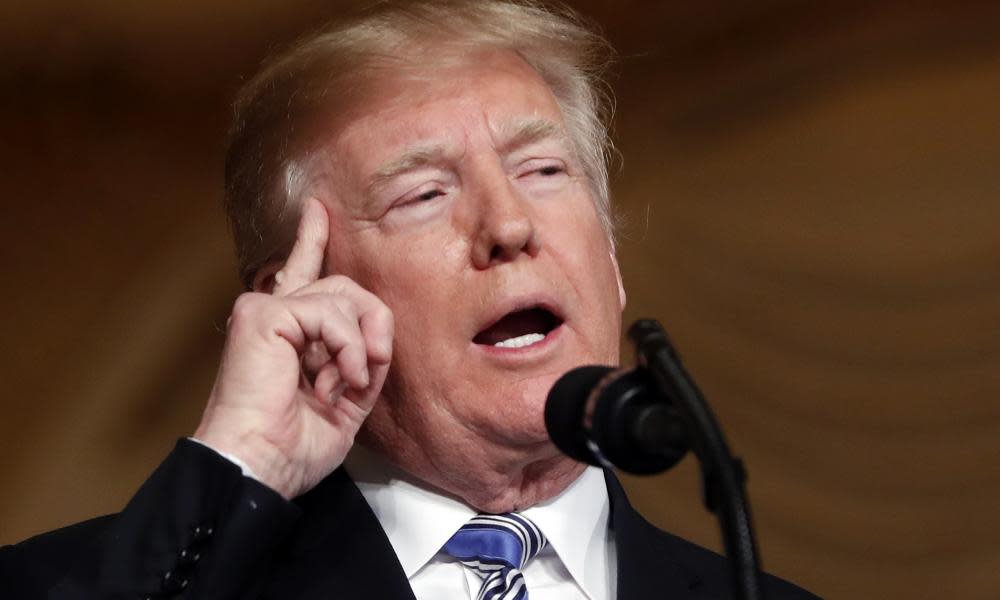Don't scrap Iran deal, MPs from UK, France and Germany urge US

More than 500 parliamentarians from France, Germany and the UK have written to their US counterparts urging them to persuade Donald Trump not to abandon the Iran nuclear deal.
In a joint statement published in the Guardian, Der Spiegel, the New York Times and Le Monde, they urged a White House rethink before the 12 May deadline set by Trump to pull out of the deal, known as the joint comprehensive plan of action (JCPOA), unless Europe can come up with a new policy that will meet his concerns.
“The US government threatens to abandon the JCPOA, although Iran fulfils its obligations under the agreement,” the letter said. They warn that “an exit from the US would have fatal consequences”.
France, Germany and the UK negotiated the landmark deal in 2015 that lifted sanctions on Iran in exchange for strict limits on its nuclear programme, and are using all their leverage to try to persuade Trump that the deal is salvageable.
“The short-term impact of this move would put an end to Iran’s nuclear programme controls, which could provide a new source of devastating conflict in the Middle East and beyond,” it said.
But it said even more serious were the long-term risks: damage to the credibility of the signatories as partners in international negotiations and more generally to diplomacy as a tool to secure lasting peace and security.
“Leaving the agreement would diminish the value of all the promises and threats our countries make,” the parliamentarians said.
They added that if the deal broke down it would be nigh on impossible to assemble another grand coalition built around sanctions against Iran.
The genesis of Trump’s particular antipathy to Iran is hard to pin down. Before entering office he had been sceptical of Iran’s regional rival, Saudi Arabia. But during the 2016 election campaign all his closest foreign policy advisors, such as Michael Flynn, shared a worldview that portrays Iran as an uniquely malign actor in the Middle East and beyond. After the election, Israel, Saudi Arabia and the United Arab Emirates were successful in capturing the ear of Trump and his son-in-law and top adviser Jared Kushner.
Trump is concerned by an Iranian ballistic missile programme, the speed with which Iran could obtain a nuclear capability at the end of the 10-year deal and more broadly Iran’s interventionist stance around the Middle East – notably in Yemen, Lebanon and Syria.
The campaign was organised by the German Green MP Omid Nouripour, the French MP Delphine O of Emmanuel Macron’s En Marche! movement, and the British Conservative MP Richard Bacon.
Prominent signatories from Germany include the Green party leader, Annalena Baerbock, the leftwing politician Gregor Gysi, the FDP parliamentary group vice-president, Alexander Graf Lambsdorff, and the Bundestag vice-presidents Thomas Oppermann (SPD) and Claudia Roth (Green). There were no signatories from the CDU.
In an attempt to mollify the White House, the governments in Berlin, Paris and London have been pushing for sanctions against Iran to be stepped up rather than for the cancelling of the deal. And the letter’s signatories criticised Tehran’s “aggressive policies” at home and abroad.
“As much we share the concerns expressed by many about Iran’s behaviour,” the parliamentarians said, “we are deeply convinced that these issues must be treated separately … and not within the context of the JCPOA.”
Intensive contacts on a near-daily basis are under way between British and French diplomats who are seeking to come up with a formula, ideally ahead of a meeting next week between Macron and Trump in the White House. The diplomats are looking to see whether the current inspection system agreed under the deal could be extended to military sites, laboratories and universities.
France is trying to lower expectations for the Macron meeting, saying there was a large ceremonial element to the state visit, but the French were looking at a possible joint EU-US statement reinterpreting aspects of the deal without tearing it up.
EU diplomats were not able to agree a new round of sanctions against Iran at their meeting on Monday, partly due to Italian objections that the sanctions might damage Russia.
Delphine O, a French politician and expert on Iran, said: “We hope that as fellow parliamentarians the US Congress will listen to us. We are stressing that issues outside the JCPOA, such as the Iran missile program or behaviour in Yemen must be handled separately. There is complete unity on this in Europe.”
She added it was possible a delegation of European parliamentarians will travel to Washington to reinforce the message. If Trump was not to renew the waiver on Iran, she pointed out, it will be for Congress the decide what sanctions should be imposed.

 Yahoo News
Yahoo News 
